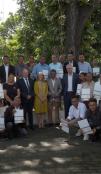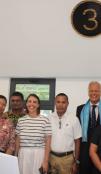A new project to stop plastic waste in Timor-Leste funded by The European Union

“Hamenus Lixu Plastiku (HLP)” - Reduce Plastic Waste is a new 3 years’ project funded by the European Union (EU) to limit plastic waste generation. It’s a project that supports the Civil Society Organizations and local business to participate in creating plastics circular economy and to participate in advocating for a cleaner, healthier and more prosperous Timor-Leste.
Led by Mercy Corps in partnership with local CSO Permatil, the project will directly benefit 10,000 residents of Dili with environmental awareness campaign messages, 1,200 children and school staff from five primary schools, four CSOs/social enterprises, 20 local refuse collectors and/or processors and 6 upcycles or plastic alternative enterprises. Indirectly, it will reach the 234,000 residents of Dili, Timor-Leste, who will benefit from this innovative application of the circular economy, and from a reduction in the short and long-term negative effects associated with exposure to plastic waste.
“Plastic has proved to be of great convenience to us all and we use it in one form or another hundreds of times a day. But non-biodegradable plastics are hugely damaging for the environment, especially the marine environment, and unless we take action there will soon be more plastic than fish in the ocean. An excess of waste plastics on land also has negative effects on people's health. To reduce waste and to continue to take economic benefit from plastics, we need to recycle whenever possible. This is what this innovative new circular economy initiative is all about – re-using the plastic in bottles and other containers for other purposes: for instance to build roads and make paving slabs. The European Union is proud to support this project which will help to reduce waste in Timor-Leste, and provide economic and health benefits to a wide-range of people,” said Andrew Jacobs, Ambassador of the European Union to Timor-Leste.
The scale of the plastics problem is enormous: one billion plastic bags and 125 million plastic bottles are used and discarded annually in Timor-Leste. Waste collection is inadequate and the destruction of plastics by burning is harmful to health.
The project is aligned with the government’s strong and growing commitment to its ‘Zero Plastic’ goal and it will work closely with the Secretary of State for Environment, and the Ministry of Education, Youth andSports.
To help achieve its objectives, the project will collaborate with the Plastics Solutions Alliance to improve plastic waste management in Timor-Leste. The Alliance members include Caltech Ltd., HEINEKEN®., Korea International Cooperation Agency (KOICA), and The United States Agency for International Development (USAID), together with Mercy Corps.





